While starting out in no small way as a composer of piano ragtime, Harry Austin Tierney soon became a versatile songwriter, contributing quite a few worthy numbers, and some stage musicals, into the vast catalog of American popular music. He was born in Perth Amboy, New Jersey, to Emery Mills foreman and Irish immigrant Patrick Tierney and his New York-born wife, Katherine E. Morrissey. Harry had two brothers, including John (8/24/1888) and Joseph V. (8/1897).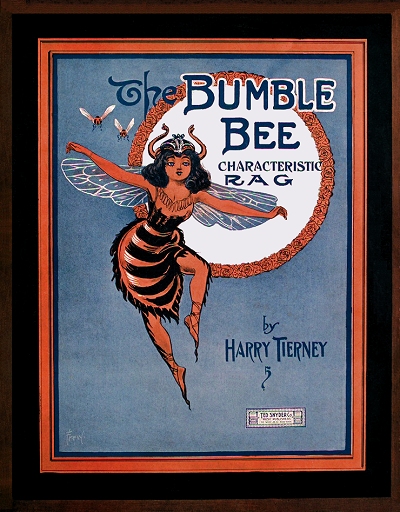 One New Jersey birth and baptism source claimed an 1889 birth, but the interval after the birth of John would have been just over eight months, and all other sources consistently point to 1890, so the latter will considered as correct. Later citations of 1895 are also clearly incorrect.
One New Jersey birth and baptism source claimed an 1889 birth, but the interval after the birth of John would have been just over eight months, and all other sources consistently point to 1890, so the latter will considered as correct. Later citations of 1895 are also clearly incorrect.
 One New Jersey birth and baptism source claimed an 1889 birth, but the interval after the birth of John would have been just over eight months, and all other sources consistently point to 1890, so the latter will considered as correct. Later citations of 1895 are also clearly incorrect.
One New Jersey birth and baptism source claimed an 1889 birth, but the interval after the birth of John would have been just over eight months, and all other sources consistently point to 1890, so the latter will considered as correct. Later citations of 1895 are also clearly incorrect.Harry initially studied music under his mother, who was an accomplished pianist. Then he got further training in both music and composition under his uncle, Nicholas Morrissey, a symphonic trumpet player associated with several orchestras. He would eventually graduate from the Virgil Conservatory of Music in New York City with a degree in composition and harmony. Even before his emergence from formal training, at age 19 in 1909, Tierney contributed his first known published composition to the world, The Bumble Bee: A Characteristic Rag, issued by Ted Snyder in New York. The following year saw only one waltz and a sentimental song from Harry's pen as he continued his schooling. However, in 1911 he veritably burst onto the scene, composing over a dozen works, most of them in the ragtime vein. Among this, his standouts are considered to be Black Canary, Dingle Pop Hop, Fluer-De-Lis, and the popular Crimson Rambler Rag. Another often-overlooked and rare work is William's Wedding, a rambunctious ragtime celebration. A few of them made it quickly to piano roll renditions.
In addition to composing, Harry toured the country, sometimes on the vaudeville circuit, as a concert pianist, playing everything from classics to his own rags, and other popular tunes of the day.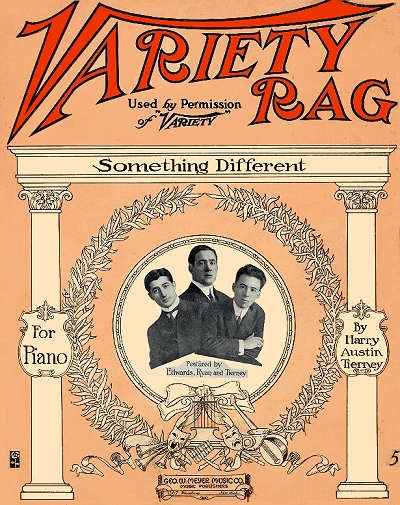 A write-up in the Irish-American Advocate in 1946 states that this tour went from 1911 into 1913. Part of the tour evidently involved an old Brooklyn friend and entertainer, Jack Ryan. Originally teamed with Gus Van (later of Van and Schenck), and then Ralph Edwards, they were considered one of the first "rathskellar" acts, referring to a type of German restaurant or beer tavern that was found in basement levels of many buildings from New York through Wisconsin. Harry's Variety Rag, referring to the famous show business trade paper with their logo on the cover, featured a picture of Ryan, Edwards and Tierney from around 1912. Harry handled the piano duties while his partners did the singing and hoofing.
A write-up in the Irish-American Advocate in 1946 states that this tour went from 1911 into 1913. Part of the tour evidently involved an old Brooklyn friend and entertainer, Jack Ryan. Originally teamed with Gus Van (later of Van and Schenck), and then Ralph Edwards, they were considered one of the first "rathskellar" acts, referring to a type of German restaurant or beer tavern that was found in basement levels of many buildings from New York through Wisconsin. Harry's Variety Rag, referring to the famous show business trade paper with their logo on the cover, featured a picture of Ryan, Edwards and Tierney from around 1912. Harry handled the piano duties while his partners did the singing and hoofing.
 A write-up in the Irish-American Advocate in 1946 states that this tour went from 1911 into 1913. Part of the tour evidently involved an old Brooklyn friend and entertainer, Jack Ryan. Originally teamed with Gus Van (later of Van and Schenck), and then Ralph Edwards, they were considered one of the first "rathskellar" acts, referring to a type of German restaurant or beer tavern that was found in basement levels of many buildings from New York through Wisconsin. Harry's Variety Rag, referring to the famous show business trade paper with their logo on the cover, featured a picture of Ryan, Edwards and Tierney from around 1912. Harry handled the piano duties while his partners did the singing and hoofing.
A write-up in the Irish-American Advocate in 1946 states that this tour went from 1911 into 1913. Part of the tour evidently involved an old Brooklyn friend and entertainer, Jack Ryan. Originally teamed with Gus Van (later of Van and Schenck), and then Ralph Edwards, they were considered one of the first "rathskellar" acts, referring to a type of German restaurant or beer tavern that was found in basement levels of many buildings from New York through Wisconsin. Harry's Variety Rag, referring to the famous show business trade paper with their logo on the cover, featured a picture of Ryan, Edwards and Tierney from around 1912. Harry handled the piano duties while his partners did the singing and hoofing.The rigours of touring meant less time to compose, so only a handful of rags came from Harry in 1912 and 1913, one of the more popular pieces being his Chicago Tickle, which was also released as the Tierney Rag. In 1913 Harry married Josephine Ann Kerry (possibly Kenny), and according to a passport application they went abroad to Europe so he could perform some more - up to a year being indicated. Edwards and Ryan joined them for at least part of the trip for a series of appearances. However, a disagreement between them had Ralph Edwards leaving the act and returning to the U.S. Tierney and Ryan continued as a "piano act" and hd a great deal of success during their remaining stay. They continued a run in vaudeville theaters and rathskellars after returning to New York, the Prospect Theatre in Brooklyn being one of their favorite haunts. An article found in the Brooklyn Daily Eagle of September 13, 1914, was more focused on Jack, but gave a little background, even if suspect, including a contrived backstory that had Harry grown up in Brooklyn instead of Perth Amboy, where he still had a residence:
"That same old Jack!" "He's just as lively as ever!" and many another such phrase will be heard from the patrons of the Bushwick Theater this week, after they see the rathskeller act delivered by two Brooklyn boys, Jack Ryan and Harry Tierney. The two boys were born and brought up in Brooklyn. They attended the public schools here, and wore their first pair of long trousers in Brooklyn. Harry's first job was in a South Brooklyn shoe shop [unconfirmed], where he met his present pal and partner, Jack Ryan. They immediately became chums, and gradually learned something about each other, of interest to both. Harry could play the piano, while Jack was a singer. They gained their popularity in Brooklyn through their entertainments in leading cabarets and restaurants in the city. They have many friends in Brooklyn, and Manager Benedict Bintt has already announced that many theater parties have been planned in their honor. The boys recently returned from a successful tour of Europe, on the last trip made by the Vaterland, before the present European crisis. While in London they appeared before the nobility of England, entertaining the King and Queen, Lor Lonsdale, the Duchess of Marlborough, Lady Henry and Lord Roberts [confirmed in British newspapers]. They were also the guests of Alfred G. Vanderbilt and Anthony Drexel, the Philadelphia millionaire, while they were in Europe.
The Brooklyn origin for Harry was commonly repeated in other articles about the pair.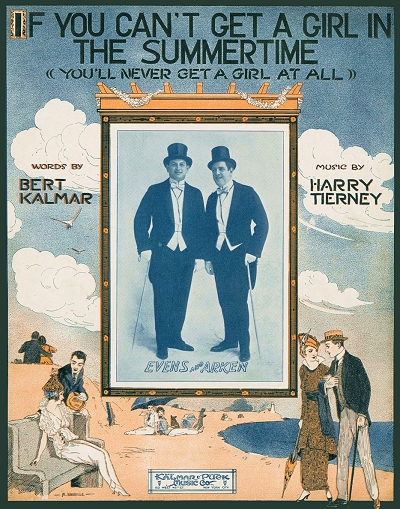 Oddly enough, while they were touted in the trades as successful songwriters, Tierney and Ryan appear to have not written, or at least published, any co-written material. While he was working with Ryan over the next two or years, Tierney endeavored to, as stated in the Irish-American Advocate write-up, specialize in "the application of modern school of harmony to light opera." In other words, write and/or contribute to stage musicals. In 1914 Harry put out a few songs to his own lyrics. However, having already composed with three other writers, he sound found his gift was in his musical settings of lyrics written by others, and he endeavored to find a partner with which he could turn out hits and stage numbers. To that end, he worked with at least eight different lyricists during 1914 to 1915, but no hits, and nothering really enduring. For a song to really be a hit, but the music and lyrics have to mesh and engender some fondness among both the public and performers of the time, and this requires some level of chemistry and compatibility between the writers, something Tierney had not yet encountered. During this period, however, he continued to gain a good reputation as a musician while working with Ryan. He also spent part of 1915 and 1916 in London working as a staff composer for British publisher Francis, Day and Hunter. He wrote elements of some shows that made it to the East End, including in the Alhambra Theater, which won some critical acclaim in the London press.
Oddly enough, while they were touted in the trades as successful songwriters, Tierney and Ryan appear to have not written, or at least published, any co-written material. While he was working with Ryan over the next two or years, Tierney endeavored to, as stated in the Irish-American Advocate write-up, specialize in "the application of modern school of harmony to light opera." In other words, write and/or contribute to stage musicals. In 1914 Harry put out a few songs to his own lyrics. However, having already composed with three other writers, he sound found his gift was in his musical settings of lyrics written by others, and he endeavored to find a partner with which he could turn out hits and stage numbers. To that end, he worked with at least eight different lyricists during 1914 to 1915, but no hits, and nothering really enduring. For a song to really be a hit, but the music and lyrics have to mesh and engender some fondness among both the public and performers of the time, and this requires some level of chemistry and compatibility between the writers, something Tierney had not yet encountered. During this period, however, he continued to gain a good reputation as a musician while working with Ryan. He also spent part of 1915 and 1916 in London working as a staff composer for British publisher Francis, Day and Hunter. He wrote elements of some shows that made it to the East End, including in the Alhambra Theater, which won some critical acclaim in the London press.
 Oddly enough, while they were touted in the trades as successful songwriters, Tierney and Ryan appear to have not written, or at least published, any co-written material. While he was working with Ryan over the next two or years, Tierney endeavored to, as stated in the Irish-American Advocate write-up, specialize in "the application of modern school of harmony to light opera." In other words, write and/or contribute to stage musicals. In 1914 Harry put out a few songs to his own lyrics. However, having already composed with three other writers, he sound found his gift was in his musical settings of lyrics written by others, and he endeavored to find a partner with which he could turn out hits and stage numbers. To that end, he worked with at least eight different lyricists during 1914 to 1915, but no hits, and nothering really enduring. For a song to really be a hit, but the music and lyrics have to mesh and engender some fondness among both the public and performers of the time, and this requires some level of chemistry and compatibility between the writers, something Tierney had not yet encountered. During this period, however, he continued to gain a good reputation as a musician while working with Ryan. He also spent part of 1915 and 1916 in London working as a staff composer for British publisher Francis, Day and Hunter. He wrote elements of some shows that made it to the East End, including in the Alhambra Theater, which won some critical acclaim in the London press.
Oddly enough, while they were touted in the trades as successful songwriters, Tierney and Ryan appear to have not written, or at least published, any co-written material. While he was working with Ryan over the next two or years, Tierney endeavored to, as stated in the Irish-American Advocate write-up, specialize in "the application of modern school of harmony to light opera." In other words, write and/or contribute to stage musicals. In 1914 Harry put out a few songs to his own lyrics. However, having already composed with three other writers, he sound found his gift was in his musical settings of lyrics written by others, and he endeavored to find a partner with which he could turn out hits and stage numbers. To that end, he worked with at least eight different lyricists during 1914 to 1915, but no hits, and nothering really enduring. For a song to really be a hit, but the music and lyrics have to mesh and engender some fondness among both the public and performers of the time, and this requires some level of chemistry and compatibility between the writers, something Tierney had not yet encountered. During this period, however, he continued to gain a good reputation as a musician while working with Ryan. He also spent part of 1915 and 1916 in London working as a staff composer for British publisher Francis, Day and Hunter. He wrote elements of some shows that made it to the East End, including in the Alhambra Theater, which won some critical acclaim in the London press.While some of Harry's tunes had been interpolated into shows in both London and New York by 1916, his real successes were just around the corner. Returning from London that year, he first went out to California write some numbers for the west coast premiere of a couple of Oliver Morosco's shows.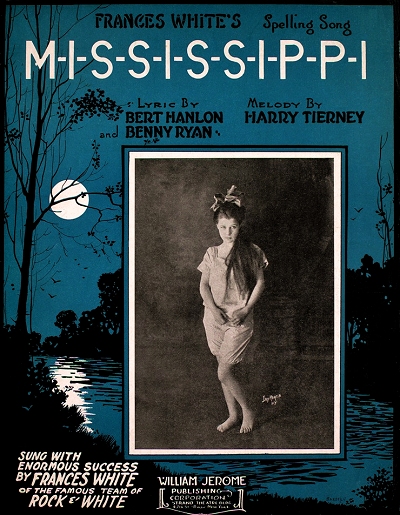 Then, coming back to New York, he joined the professional staff of Waterson, Berlin and Snyder, contributing both popular songs and some pieces that found their way into the Ziegfeld Follies and other shows. It was there that he was teamed up with experienced lyricist Alfred Bryan, and they soon found their stride. Among their first assignments was to co-write a show with the former Mrs. Ziegfeld, French singer sensation Anna Held, who was unfortunately nearing the end of her career and her life, but still hoping for additional fame. Together they came up with the musicl comedy revue Follow Me, which played from late November, 1916, into February, 1917, at the Casino Theater in New York. Beyond that, the team of Tierney and Bryan turned out a number of passble songs, including the Great War number, It's Time for Every Boy to Be a Soldier. By this time, Tierney had become very busy with his writing, and live appearances became less frequent, including with Ryan, who soon found another partner. In the spring of 1917 Tierney and Bryan came out with What's Next. Tepidly reviewed, it apparently never made it to one of the Broadway theaters. That was the last of their work together.
Then, coming back to New York, he joined the professional staff of Waterson, Berlin and Snyder, contributing both popular songs and some pieces that found their way into the Ziegfeld Follies and other shows. It was there that he was teamed up with experienced lyricist Alfred Bryan, and they soon found their stride. Among their first assignments was to co-write a show with the former Mrs. Ziegfeld, French singer sensation Anna Held, who was unfortunately nearing the end of her career and her life, but still hoping for additional fame. Together they came up with the musicl comedy revue Follow Me, which played from late November, 1916, into February, 1917, at the Casino Theater in New York. Beyond that, the team of Tierney and Bryan turned out a number of passble songs, including the Great War number, It's Time for Every Boy to Be a Soldier. By this time, Tierney had become very busy with his writing, and live appearances became less frequent, including with Ryan, who soon found another partner. In the spring of 1917 Tierney and Bryan came out with What's Next. Tepidly reviewed, it apparently never made it to one of the Broadway theaters. That was the last of their work together.
 Then, coming back to New York, he joined the professional staff of Waterson, Berlin and Snyder, contributing both popular songs and some pieces that found their way into the Ziegfeld Follies and other shows. It was there that he was teamed up with experienced lyricist Alfred Bryan, and they soon found their stride. Among their first assignments was to co-write a show with the former Mrs. Ziegfeld, French singer sensation Anna Held, who was unfortunately nearing the end of her career and her life, but still hoping for additional fame. Together they came up with the musicl comedy revue Follow Me, which played from late November, 1916, into February, 1917, at the Casino Theater in New York. Beyond that, the team of Tierney and Bryan turned out a number of passble songs, including the Great War number, It's Time for Every Boy to Be a Soldier. By this time, Tierney had become very busy with his writing, and live appearances became less frequent, including with Ryan, who soon found another partner. In the spring of 1917 Tierney and Bryan came out with What's Next. Tepidly reviewed, it apparently never made it to one of the Broadway theaters. That was the last of their work together.
Then, coming back to New York, he joined the professional staff of Waterson, Berlin and Snyder, contributing both popular songs and some pieces that found their way into the Ziegfeld Follies and other shows. It was there that he was teamed up with experienced lyricist Alfred Bryan, and they soon found their stride. Among their first assignments was to co-write a show with the former Mrs. Ziegfeld, French singer sensation Anna Held, who was unfortunately nearing the end of her career and her life, but still hoping for additional fame. Together they came up with the musicl comedy revue Follow Me, which played from late November, 1916, into February, 1917, at the Casino Theater in New York. Beyond that, the team of Tierney and Bryan turned out a number of passble songs, including the Great War number, It's Time for Every Boy to Be a Soldier. By this time, Tierney had become very busy with his writing, and live appearances became less frequent, including with Ryan, who soon found another partner. In the spring of 1917 Tierney and Bryan came out with What's Next. Tepidly reviewed, it apparently never made it to one of the Broadway theaters. That was the last of their work together.Almost as soon as his professional association with Bryan ended, Harry left Waterson, Berlin and Snyder and signed with the popular publisher Jerome H. Remick. While there, Harry wrote a number of semi-popular tunes with another seasoned professional, Stanley Murphy, including the popular In My Irish Aeroplane and a song version of his earlier rag, Fleur-de-Lis. His 1917 draft record showed him as still married and now living full time in Manhattan, working for the Remick organization. He apparently did not serve during the war, which was not uncommon for married men of his age working in the entertainment field. Early in 1918 Tierney wrote one of his last published instrumentals, Arya, an intermezzo. From that point on he would write virtually all songs, and no piano solos. Even though he was working for Remick for some years, some of Tierney's show material was often issued under different publishers like Shapiro and Bernstein or Leo Feist due to theatrical contractual obligations.
In mid-1918, Harry found both his stride and his most prolific partner, also of Irish heritage, Joseph McCarthy. Out of the starting gate they came up with (Everything is Hunky Dory Down in) Honky Tonky Town, which was one of the features in a show that opened in August, 1918, at the Hippodrome, assembled by famous producer Charles Dillingham. It was a hit, and they gained momentum from there, including My Baby's Arms which was a Follies hit, and recorded by a few jazz bands. After a number of fairly well-regarded tunes during and after the war, the team came up with the musical Irene, based on a play by James Montgomery who also wrote the book for the show. It debuted to great acclaim at the Vanderbilt Theater in New York on November 18, 1919. No small performer, Irene saw no less than 675 performances in its initial record-breaking Broadway run, closing in June of 1921, but not before several road companies had similar success with the property. A typical review was found in the Washington Post of November 12, 1918, when the showed played there in previews:
'Irene,' which was revealed for the first time at Poli's Theater last night, was recognized by an audience that threatened the capacity of the house as the most delightful light musical entertainment that has found its way to the stage in many months. It will be just such a 'failure' as 'The Merry Widow,' 'The Pink Lady,' and 'The Lilac Domino.' The musical interludes provide a wide variety of solos, duets, concerted numbers by the principals and ensembles that are sure of popular approval. 'Alice Blue Gown,' 'Castle of Dreams,' 'We're Getting Away With It,' 'Irene,' 'Skyrocket' and 'The Last Part of Every Party' are songs that will never be sung to be forgotten. 'Skyrocket' alone, with its wonderful rhythm and lively syncopations, would be enough to 'put the show over,' unfortified by a list of hits.
The obvious runaway hit of the show was the poignant waltz-song Alice Blue Gown, which is still being performed by young women a century later on YouTube.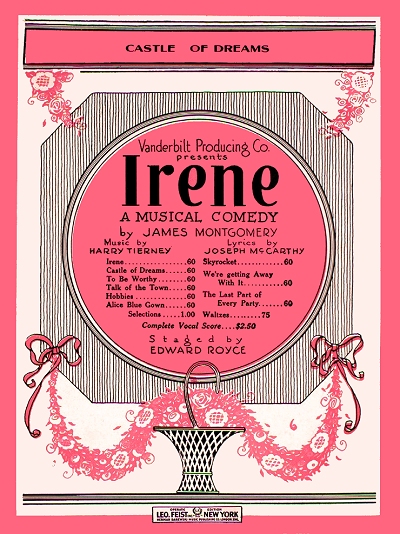 It was a hit again when Irene was made into a silent motion picture in 1926, based on the play, and again in 1940 when it was transformed into a film musical by RKO Pictures. The play eventually made it back to the stage in 1973 starring Debbie Reynolds in the title role. It was clear that the boys had something going. A September, 1949, article in Billboard suggested that "there was a creative affinity between Tierney and [McCarthy] as close as love and kisses or ham and eggs." The team's success continued into 1920 with several pieces interpolated into revues and shows around New York, plus a few comic numbers not associated with any productions.
It was a hit again when Irene was made into a silent motion picture in 1926, based on the play, and again in 1940 when it was transformed into a film musical by RKO Pictures. The play eventually made it back to the stage in 1973 starring Debbie Reynolds in the title role. It was clear that the boys had something going. A September, 1949, article in Billboard suggested that "there was a creative affinity between Tierney and [McCarthy] as close as love and kisses or ham and eggs." The team's success continued into 1920 with several pieces interpolated into revues and shows around New York, plus a few comic numbers not associated with any productions.
 It was a hit again when Irene was made into a silent motion picture in 1926, based on the play, and again in 1940 when it was transformed into a film musical by RKO Pictures. The play eventually made it back to the stage in 1973 starring Debbie Reynolds in the title role. It was clear that the boys had something going. A September, 1949, article in Billboard suggested that "there was a creative affinity between Tierney and [McCarthy] as close as love and kisses or ham and eggs." The team's success continued into 1920 with several pieces interpolated into revues and shows around New York, plus a few comic numbers not associated with any productions.
It was a hit again when Irene was made into a silent motion picture in 1926, based on the play, and again in 1940 when it was transformed into a film musical by RKO Pictures. The play eventually made it back to the stage in 1973 starring Debbie Reynolds in the title role. It was clear that the boys had something going. A September, 1949, article in Billboard suggested that "there was a creative affinity between Tierney and [McCarthy] as close as love and kisses or ham and eggs." The team's success continued into 1920 with several pieces interpolated into revues and shows around New York, plus a few comic numbers not associated with any productions.The 1920 census showed Harry living in Manhattan with Josephine. Almost immediately after it was taken, he went back to London, this time with McCarthy, to provide assistance and music for a couple of shows there, including Afgar, in which they had some songs interpolated. The pair returned to the US in mid-April. They returned in late 1920 for a couple of months to help stage Irene in London. While most of 1920 and 1921 involved interpolations, in 1922 the boys were hired by producer William A. Brady to provide the musical material for Up She Goes, a farce based on the play Too Many Cooks. This success was followed by several songs in Glory. In late 1923 they had yet another success with Kid Boots starring no less than Eddie Cantor. A Music Trade Review article on the team from March 8, 1924, summed up their continuing success:
Harry Tierney and Joseph McCarthy are proving about the most dependable combination of present-day writers as contributors to the musical and vocal score in the musical comedy field. Their success in "Irene," with its "Alice Blue Gown" and several other productions, was of sufficient importance to keep their names prominent for several years. They, however, were not willing to rest on any such laurels, although "Irene" is yet touring the country into practically every language. Their later...
"Kid Boots," the new Ziegfeld production starring Eddie Cantor and Mary Eaton, has gained added importance because it has a Tierney and McCarthy score... Not only do [the songs] fit well in the show, but they have value as individual entities, as the heavy sales of not only the sheet music but the player rolls and talking machine records signify, and there are other numbers in this show that will have considerable popularity...
It is probably quite fortunate for the publisher that the vocal renditions are restricted to the show. Their popularity is already established; they arc of the calibre [sic] that will continue to hold their own over a long period and no outside forces will be able to frequently render them to an early death.
Around this time, flush with money and success, Harry and Josephine moved out to Pelham in Westchester County, taking on a husband and wife butler team as well. All seemed good for the composer.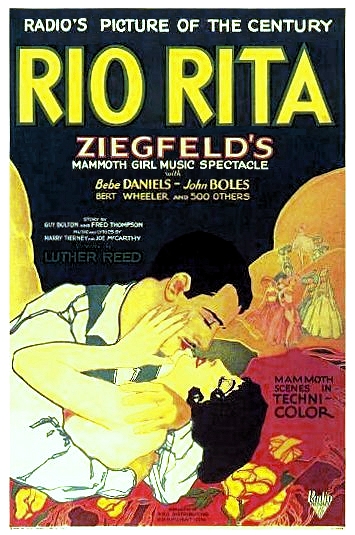 At home, however, it may not have been so rosy. The 1925 New York State census showed the Tierneys, Josephine's mother, and their wait staff, all living in Pelham. But the couple was evidently no more by 1926, as Josephine likely moved out with her mother. By that time Harry and Joseph were busy on their next big hit musical, Rio Rita. Previewing in late 1926, this Ziegfeld production opened to great acclaim in February of 1927, playing for 14 months in its initial run. It took but two years to make the story into a somewhat forgettable early sound movie musical in 1929 starring the comedy team of Bert Wheeler & Robert Woolsey, and actress Bebe Daniels, that included some scenes in two-strip Technicolor. Inexplicably when Rio Rita was revamped and resurrected in 1942 with Bud Abbott and Lou Costello, all of the Tierney/McCarthy material was replaced with music by Herbert Stothart, as well as several songs by no less than Harold Arlen and E. Yip Harburg which were rejected.
At home, however, it may not have been so rosy. The 1925 New York State census showed the Tierneys, Josephine's mother, and their wait staff, all living in Pelham. But the couple was evidently no more by 1926, as Josephine likely moved out with her mother. By that time Harry and Joseph were busy on their next big hit musical, Rio Rita. Previewing in late 1926, this Ziegfeld production opened to great acclaim in February of 1927, playing for 14 months in its initial run. It took but two years to make the story into a somewhat forgettable early sound movie musical in 1929 starring the comedy team of Bert Wheeler & Robert Woolsey, and actress Bebe Daniels, that included some scenes in two-strip Technicolor. Inexplicably when Rio Rita was revamped and resurrected in 1942 with Bud Abbott and Lou Costello, all of the Tierney/McCarthy material was replaced with music by Herbert Stothart, as well as several songs by no less than Harold Arlen and E. Yip Harburg which were rejected.
 At home, however, it may not have been so rosy. The 1925 New York State census showed the Tierneys, Josephine's mother, and their wait staff, all living in Pelham. But the couple was evidently no more by 1926, as Josephine likely moved out with her mother. By that time Harry and Joseph were busy on their next big hit musical, Rio Rita. Previewing in late 1926, this Ziegfeld production opened to great acclaim in February of 1927, playing for 14 months in its initial run. It took but two years to make the story into a somewhat forgettable early sound movie musical in 1929 starring the comedy team of Bert Wheeler & Robert Woolsey, and actress Bebe Daniels, that included some scenes in two-strip Technicolor. Inexplicably when Rio Rita was revamped and resurrected in 1942 with Bud Abbott and Lou Costello, all of the Tierney/McCarthy material was replaced with music by Herbert Stothart, as well as several songs by no less than Harold Arlen and E. Yip Harburg which were rejected.
At home, however, it may not have been so rosy. The 1925 New York State census showed the Tierneys, Josephine's mother, and their wait staff, all living in Pelham. But the couple was evidently no more by 1926, as Josephine likely moved out with her mother. By that time Harry and Joseph were busy on their next big hit musical, Rio Rita. Previewing in late 1926, this Ziegfeld production opened to great acclaim in February of 1927, playing for 14 months in its initial run. It took but two years to make the story into a somewhat forgettable early sound movie musical in 1929 starring the comedy team of Bert Wheeler & Robert Woolsey, and actress Bebe Daniels, that included some scenes in two-strip Technicolor. Inexplicably when Rio Rita was revamped and resurrected in 1942 with Bud Abbott and Lou Costello, all of the Tierney/McCarthy material was replaced with music by Herbert Stothart, as well as several songs by no less than Harold Arlen and E. Yip Harburg which were rejected.Tierney and McCarthy followed Rio Rita in 1928 with Cross My Heart, which had a mere 64 performances at the Knickerbocker Theatre near Broadway before shutting down. This would be their final stage musical together, although a few songs trickled out in 1929 before the team broke up. By that time, Harry's marriage to Josephine had done the same, and he had moved on, marrying Ava Lowry Auschke, 13 years his junior, on February 11, 1928, and taking her on a South American honeymoon. In early 1929, after the advent of sound films and the huge push for movie musicals, Tierney was summoned to Hollywood to consult and help produce the initial film version of Rio Rita. He also collaborated with composer Anne Caldwell for a handful of numbers in the 1930 film musical Dixiana, also starring Wheeler, Woolsey and Daniels. Kid Boots and another of his Tierney and Caldwell's lesser properties, Half Shot at Sunrise (excluding three pieces that were ultimately cut), were also made into films around 1930. During his Hollywood stay, Harry wrote two additional film musicals which were never produced.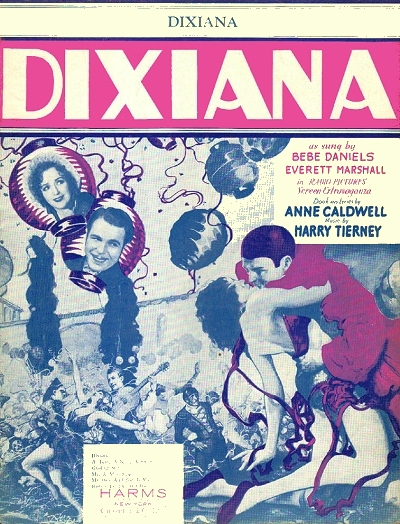 It seems that not even two years into the sound era that most studios shifted their focus from leggy girls singing silly songs to more visceral dramatic productions, so many fine properties were shelved in order to feed the public something a bit more in line with the Great Depression era ethos. The 1930 census showed Harry and Ava residing in Beverly Hills with two servants. However, this was a short-term situation, as, according to the 1949 Billboard article, Harry became "fed up with Hollywood story conferences, yes men and autocratic decisions." By 1931 the Tierneys were back in New York.
It seems that not even two years into the sound era that most studios shifted their focus from leggy girls singing silly songs to more visceral dramatic productions, so many fine properties were shelved in order to feed the public something a bit more in line with the Great Depression era ethos. The 1930 census showed Harry and Ava residing in Beverly Hills with two servants. However, this was a short-term situation, as, according to the 1949 Billboard article, Harry became "fed up with Hollywood story conferences, yes men and autocratic decisions." By 1931 the Tierneys were back in New York.
 It seems that not even two years into the sound era that most studios shifted their focus from leggy girls singing silly songs to more visceral dramatic productions, so many fine properties were shelved in order to feed the public something a bit more in line with the Great Depression era ethos. The 1930 census showed Harry and Ava residing in Beverly Hills with two servants. However, this was a short-term situation, as, according to the 1949 Billboard article, Harry became "fed up with Hollywood story conferences, yes men and autocratic decisions." By 1931 the Tierneys were back in New York.
It seems that not even two years into the sound era that most studios shifted their focus from leggy girls singing silly songs to more visceral dramatic productions, so many fine properties were shelved in order to feed the public something a bit more in line with the Great Depression era ethos. The 1930 census showed Harry and Ava residing in Beverly Hills with two servants. However, this was a short-term situation, as, according to the 1949 Billboard article, Harry became "fed up with Hollywood story conferences, yes men and autocratic decisions." By 1931 the Tierneys were back in New York.It would be a year or so of seclusion before Harry would surface again, although a few songs co-written with Raymond B. Egan did appear over the next several years on occasion. Tierney had wanted to go back to his musical training and write something of significance, an operetta. For his material he chose Arnold Kummer's novel Forbidden Wine, from which he wrote Omar Khayyam. However, the world-wide depression had hit the live entertainment industry rather hard in New York, and most producers were out of business. The mere scope of his projected production was too lavish and unsustainable during that time, so the property was never staged. But in spite of the setback, Harry had a backup plan in the guise of another 2-act operetta, Beau Brummell, based on the Clyde Fitch play, and with a libretto by Gladys Unger. This did see a few performances, including a premiere event staged by Lee Shubert at the St. Louis Municipal Theater in Forest Park, Queens, NY, to a crowd of around 10,000. It would be a last hurrah for the theater for Harry, who was only approaching his mid-forties. He did produce one other thing, however; his son, Harry Austin, Jr., born in 1934.
Over the next few years, a few more songs composed with McCarthy would find their way into print, although it is unclear if they were newly written or left over from an earlier time. Otherwise, it appears that Harry, perhaps frustrated with how hard it was to get his productions mounted, decided to retire more or less. The 1940 census showed Harry and Ava and their son residing in Pelham, with Harry still listed as a music composer. His 1942 draft record indicated that he had no employer, but did not show his vocation. The 1950 census is the next sighting of Harry, showing him as divorced, continuing his career as a composer. Little was heard from Tierney for the remainder of his life. Josephine and Harry, Jr., appear on some cruise passenger lists in the 1950s, her last name now Blackman, indicating a remarriage. The same was true for copyright renewals from the mid-1960s and later, with Harry, Jr., also listed in those records. Harry Austin Tierney died in New York a little short of his 75th birthday in 1965. He was interred at the Holy Sepulcher Cemetery in New Rochelle, New York. Tierney's works ranging from ragtime to competently penned musicals remain a part of the American music catalog, and are still frequently performed as well on stage, at festivals, and on internet media.

 Compositions
Compositions